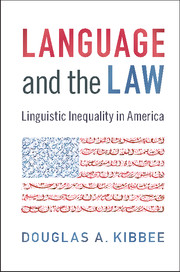Book contents
- Frontmatter
- Contents
- Preface
- Acknowledgments
- 1 Equality, Liberty, and Fairness in America
- 2 Language and Democracy
- 3 Linguistic Inequality in the Legal System
- 4 Language and Education
- 5 Government, Public Services, and the English-Only Movement
- 6 Language in the Workplace
- 7 Conclusions
- Bibliography
- Index of Court Cases
- Index of Names
- General Index
5 - Government, Public Services, and the English-Only Movement
Published online by Cambridge University Press: 05 August 2016
- Frontmatter
- Contents
- Preface
- Acknowledgments
- 1 Equality, Liberty, and Fairness in America
- 2 Language and Democracy
- 3 Linguistic Inequality in the Legal System
- 4 Language and Education
- 5 Government, Public Services, and the English-Only Movement
- 6 Language in the Workplace
- 7 Conclusions
- Bibliography
- Index of Court Cases
- Index of Names
- General Index
Summary
The federal government and many states have a long history of offering information and services in languages other than English, including but not limited to the publication of official records in other languages. The Civil Rights movement of the 1960s and Executive Orders issued by Presidents Clinton (2000) and Obama (2011) have transformed voluntary accommodations into obligatory actions, while “Official English” movements have attempted to limit those requirements. Legally, the primary issues have been discriminatory intent and disparate impact.
Accommodation of LEP residents long antedates the invention of the LEP label. The Continental Congress published a German version of the Articles of Confederation, and a congressional bill to publish the laws of the country in German (as well as English) failed by a single vote in 1795 (Kloss 1998, 28–29). In 1794, the territorial laws of Illinois were translated into French (Baron 1990, 113), but in 1810, Congress refused to let the Michigan territory publish a French version of its laws:
If Congress were to authorize the translation of the laws into the French language, they would thereby give to the translation a sanction which would entitle it to be received in the courts of that Territory as evidence of the laws of the land, and great inconvenience and confusion might result from having two separate texts for the same law, susceptible, as they necessarily would be from the imperfection of all languages, of different and perhaps opposite interpretations. (Lowrie & Franklin 1834, 71)
In the 1830s, Germans in Buffalo, NY, united to demand the publication of city council proceedings in German, a campaign led by the newly established newspaper the Weltbürger (Gerber 1984, 35).
Over the years some state constitutions and collections of state laws have been translated into various languages – German in Wisconsin, Iowa, Minnesota, Illinois, Texas, Missouri, Norwegian in Wisconsin and Minnesota, French in Minnesota and Illinois, Spanish and Czech in Texas (Kloss 1998, 100–103). The legal value of translations has been contested: “A statute or ordinance has no legal existence except in the language in which it is passed.”
- Type
- Chapter
- Information
- Language and the LawLinguistic Inequality in America, pp. 146 - 163Publisher: Cambridge University PressPrint publication year: 2016

